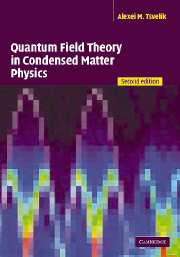Book contents
- Frontmatter
- Contents
- Preface to the first edition
- Preface to the second edition
- Acknowledgements for the first edition
- Acknowledgements for the second edition
- I Introduction to methods
- II Fermions
- III Strongly fluctuating spin systems
- IV Physics in the world of one spatial dimension
- Introduction
- 22 Model of the free bosonic massless scalar field
- 23 Relevant and irrelevant fields
- 24 Kosterlitz–Thouless transition
- 25 Conformal symmetry
- 26 Virasoro algebra
- 27 Differential equations for the correlation functions
- 28 Ising model
- 29 One-dimensional spinless fermions: Tomonaga–Luttinger liquid
- 30 One-dimensional fermions with spin: spin-charge separation
- 31 Kac–Moody algebras: Wess–Zumino–Novikov–Witten model
- 32 Wess–Zumino–Novikov–Witten model in the Lagrangian form: non-Abelian bosonization
- 33 Semiclassical approach to Wess–Zumino–Novikov–Witten models
- 34 Integrable models: dynamical mass generation
- 35 A comparative study of dynamical mass generation in one and three dimensions
- 36 One-dimensional spin liquids: spin ladder and spin S = 1 Heisenberg chain
- 37 Kondo chain
- 38 Gauge fixing in non-Abelian theories: (1 + 1)-dimensional quantum chromodynamics
- Select bibliography
- Index
23 - Relevant and irrelevant fields
Published online by Cambridge University Press: 05 May 2010
- Frontmatter
- Contents
- Preface to the first edition
- Preface to the second edition
- Acknowledgements for the first edition
- Acknowledgements for the second edition
- I Introduction to methods
- II Fermions
- III Strongly fluctuating spin systems
- IV Physics in the world of one spatial dimension
- Introduction
- 22 Model of the free bosonic massless scalar field
- 23 Relevant and irrelevant fields
- 24 Kosterlitz–Thouless transition
- 25 Conformal symmetry
- 26 Virasoro algebra
- 27 Differential equations for the correlation functions
- 28 Ising model
- 29 One-dimensional spinless fermions: Tomonaga–Luttinger liquid
- 30 One-dimensional fermions with spin: spin-charge separation
- 31 Kac–Moody algebras: Wess–Zumino–Novikov–Witten model
- 32 Wess–Zumino–Novikov–Witten model in the Lagrangian form: non-Abelian bosonization
- 33 Semiclassical approach to Wess–Zumino–Novikov–Witten models
- 34 Integrable models: dynamical mass generation
- 35 A comparative study of dynamical mass generation in one and three dimensions
- 36 One-dimensional spin liquids: spin ladder and spin S = 1 Heisenberg chain
- 37 Kondo chain
- 38 Gauge fixing in non-Abelian theories: (1 + 1)-dimensional quantum chromodynamics
- Select bibliography
- Index
Summary
In this chapter we continue to study the massless scalar field described by the action (22.1). We have seen that this model has a gapless excitation spectrum and the correlation functions of bosonic exponents followpower laws. This behaviour implies that the correlation length is infinite and the system is in its critical phase. It is certainly very important to knowhowstable this critical point is with respect to perturbations. Any model is only an idealization; when one derives it certain interactions are neglected. Howdoes one decide which interactions are important and which are not? Obviously, weak interactions are those whose influence on the correlation functions is small. The trouble is, however, that usually the correlation functions are affected differently on different scales, the long distance asymptotics being affected the most. Therefore it can happen that a certain perturbation causes only tiny changes at short distances, but changes the large distance behaviour profoundly. In the renormalization group picture this is observed as a growth of the coupling constant associated with the perturbing operator. Such growth is a frequent phenomenon in critical theories; a slow decay of their correlation functions gives rise to divergences in their diagram series.
Operators whose influence grows on large scales (small momenta) are called ‘relevant’. The problem of relevancy of perturbations can be formulated and solved in a general form. Suppose we have a system at criticality (i.e. all its correlation functions decay as a power law at large distances).
- Type
- Chapter
- Information
- Quantum Field Theory in Condensed Matter Physics , pp. 206 - 211Publisher: Cambridge University PressPrint publication year: 2003

